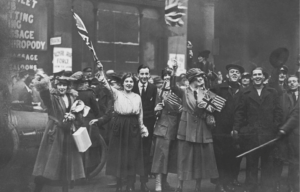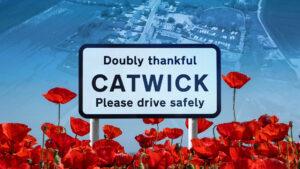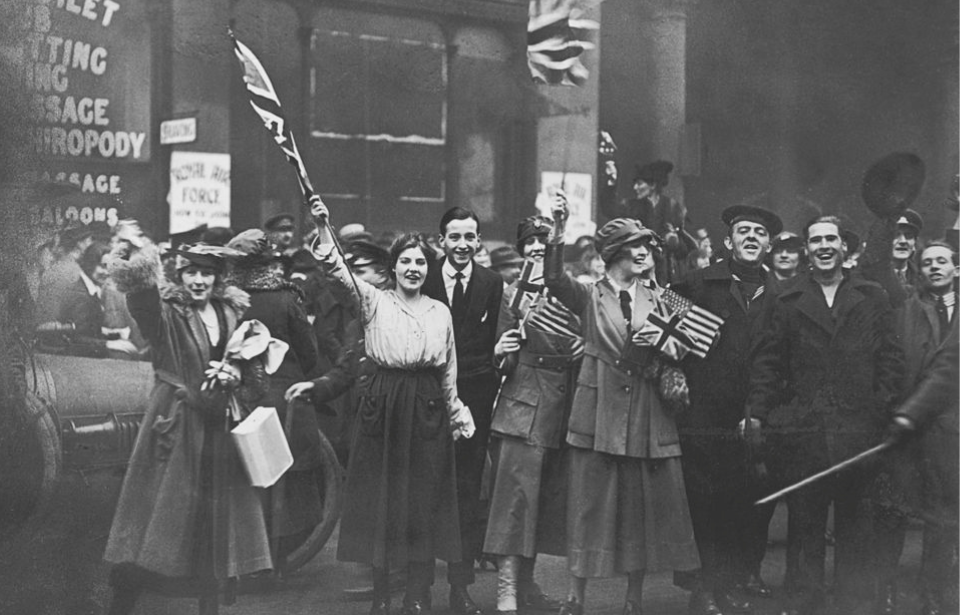Forgotten Friday – Thankful Villages By Trish Wade
From 1914 to 1918 communities across the world suffered atrocious losses due to their young men leaving home to fight in the First World War. Over 700,000 British subjects alone died in this conflict. There was hardly a city, town or village that wasn’t affected by the loss, hardly a family who didn’t suffer heartache.
A lot of the smaller villages and surrounding parishes were affected in the casualty figures by the forming of ‘Pals Battalions’ in which groups of friends, work colleagues, sporting teams, neighbours and friends would enlist together and fight in the same battalion. This system contributed to sometimes devastating losses to so many communities.

Photo Credit: Topical Press Agency / Stringer / Getty Images
However, there were some villages across England and Wales where all who had gone off to serve King and country suffered no casualties and all who went to fight returned home. There are no accounts of villages from Scotland and Ireland that didn’t have casualties. These villages became known as ‘Thankful Villages’. This term became popular in the 1930’s due to the writer Arthur Mee using the phrase in one of his guidebooks ‘The King’s England’ written in 1936. Whilst on his travels he realised that in some communities there were no memorials to the fallen in the Great War. Upon further investigation he found that this was because all the men, from these villages and parishes, who had gone to fight had returned. He wrote “a Thankful Village was one which had lost no men in the war because all those who left to serve came home again”.
Out of an estimated 16,000 villages in England, nearly every one of them had young men who answered the call of duty to serve the King. There were it is said, following recent research, around 56 villages that didn’t suffer any fatalities and all those who went off to fight came home to their families. That said, they may have come home alive, but many were injured and traumatised by what they had witnessed on the front. Arthur Mee wrote of the village of Catwick in East Yorkshire ‘Thirty men went from Catwick to the Great War and thirty came back, although one man left an arm behind’. The village blacksmith, John Hugill, had been given coins by the thirty men who had gone to war and he nailed them to a door post at the smithy underneath a horseshoe. This was thought to be the good luck that the villagers had hoped for when going off to war. He cut a notch in one of the coins to represent the missing limb of Joseph Grantham.
When World War Two broke out the villagers thought that the coins would afford the men, going off to fight, the same luck. They thought that if it worked the first time it could work again and keep their men safe. This apparently worked and they all came home after the war. Catwick then became what was known as a Doubly Thankful village.

Doubly Thankful villages were communities who suffered no losses in both World wars. Research has shown that there are between fourteen and seventeen such villages in England and two in Wales.
Doubly Thankful Villages
England.
- Allington – Lincolnshire
- Arkholme – Lancashire
- Bradbourne – Derbyshire
- Butterton – Staffordshire
- Catwick – Yorkshire
- Flixborough – Lincolnshire
- Herodsfoot – Cornwall
- High Toynton – Lincolnshire
- Langton Herring – Dorset
- Middleton on the Hill – Herefordshire
- Nether Kellet – Lancashire
- South Elmham St Michael – Suffolk
- Stock Linch – Somerset
- Upper Slaughter – Gloucestershire
- Woolley – Somerset
Wales
- Llanfihangel y Creuddyn
- Herbrandston
After the Great War there was, for these Thankful Villages, a feeling of relief for the families of those who returned home alive, however, there was also another emotion that the villages in these communities felt and it was one of ‘shame’. Here they were surrounded by other villages who hadn’t been as fortunate and were suffering the grief of loss. The Thankful villagers were ‘thankful’ for the safe return of their loved ones but also there was a feeling that they had not joined in the sacrifice made by others. It was like they had benefited from the peace of war but felt like they had not paid the ultimate price. It has only been with the passing of time this feeling has been diminished.
It was simply luck against all odds that the Thankful and Doubly Thankful villages happened. Thanks to the efforts of a group of motorcyclists in 2013 the villages now have plaques to celebrate their place in history.


